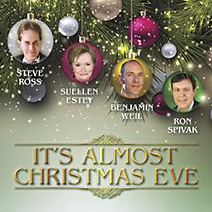Steve Ross & Friends
It’s Almost Christmas Eve
(The Musical Theater Project/Harbinger Records)
November 19, 2018
Reviewed by Alix Cohen for Cabaret Scenes
 This utterly charming compilation is a sure cure for endlessly looped holiday carols that make you want to run screaming from speaker-laden interiors. Excepting a few classics refreshed by tuneful minimalism, these are songs you’ve likely never heard. Whether from 1916 or 2017, they have the palpably warm feeling of a group of friends—Steve Ross, SuEllen Estey, Benjamin Weil, Ron Spivak—around the piano. In fact, the CD was inspired by just such a gathering, a seasonal Murray Hill event at which Ross and Weil found themselves disinterring gems.
This utterly charming compilation is a sure cure for endlessly looped holiday carols that make you want to run screaming from speaker-laden interiors. Excepting a few classics refreshed by tuneful minimalism, these are songs you’ve likely never heard. Whether from 1916 or 2017, they have the palpably warm feeling of a group of friends—Steve Ross, SuEllen Estey, Benjamin Weil, Ron Spivak—around the piano. In fact, the CD was inspired by just such a gathering, a seasonal Murray Hill event at which Ross and Weil found themselves disinterring gems.
Donald Pippin and Carolyn Leigh’s 1979 “Sing a Little Song of Christmas” (the company) is bubbly and bright—nostalgia at an urban festivity, crackling fire, eggnog, optimism. Irving Berlin’s 1916 “Santa Claus: A Syncopated Christmas Song” (Weil and Spivak) evokes a line of tapping chorines in red satin and pom-pomed hats. The old-timey piano is a melodic grin. Irving Berlin’s 1954’s “Snow” (the company) from White Christmas conjures movie musicals.
Steve Ross/Ron Hirsch/Rosie Casey’s 2017 “It’s Almost Christmas Eve” (the company) and the organically tandem “Christmas Eve” by Carlton Carpenter from 1953 (Weil) are gently shaken snow globes. Harmonized phrases emerge like unpacked childhood ornaments. Listen for angel hair.
The winsome “Who Says There Ain’t No Santa Claus?” (Sammy Fain/Yip Harburg, 1951’s Flahooley)—“Do I see a reindeer or am I gone insane, dear”—is a winking duet by Estey and Weil, whereas the Burt Bacharach/Hal David “A Fact Can Be a Beautiful Thing” (Estey) from 1968’s Promises, Promises) decidedly raises an eyebrow.
Victor Herbert/Glen MacDonough “Toyland” (Babes in Toyland, 1903) touches the heart, first as a powdery solo by Ross, then with wistful voices. The room actually goes still. Bookending Victor Millrose/Alan Bernstein’s “Elves and Shelves” “of happy toys” (the company) adds color to a fading photograph.
Two familiar numbers, “We Need a Little Christmas” (Jerry Herman 1966, Mame) and “A New Deal for Christmas” (Charles Strouse/Martin Charnin 1977, Annie) land differently as intimate solos—the former by Weil; the latter by Spivak. A low key, personal point of view makes lyrics less diffused, more meaningful. You won’t know Jule Styne/Stephen Sondheim’s 1959 “Three Wishes for Christmas” (Weil) as it was cut from the musical Gypsy. It’s images are so holiday perfect, the ballad might almost be Berlin’s.
Accompaniment was provided only by the masterful Ross; his pristine arrangements and symbiotic good spirits buoy performance. Three quarters of the lyrics are sentimental, jaunty, evocative. One quarter allows for other possibilities. These include Spivak’s “I Don’t Remember Christmas” “and I don’t remember you!” (David Shire/Richard Maltby Jr. 1976); the sympathetic “After the Holidays” sung by Estey (John Meyer 1973)—“Please stay with me till after the holidays, I know it’s hard, but try”’ and Frederick Silver’s droll 1968 “The Twelve Days After Christmas” performed by the company—“The first day after Christmas, my true love and I had a fight/And so I chopped the pear tree down and burned it just for spite.”
John Forster and Tom Toce’s “Christmas in New York” (Weil) offers local, urban details: “a window-shopping spree” and “skating in the park/Listening to Hark the Herald Angels” (lovely internal rhyme). “Together This Christmas” (Alex Rybeck/Barbara Fried, 2010) finds the male duo of Weil and Spivak singing “Writing the cards, signing both our names/Showing that the two of us are a pair.” Steve Ross’s heartfelt rendition of “A Christmas Wish for You” (Duncan Lamont) is lilting, humble, universal: “Peace and earth seems far away/But we can hope and we can pray.” (1991, but it might just as well have been written today.)
We end with “The Wassail Song” deftly performed by the four vocalists, mostly in shining, able a cappella.





